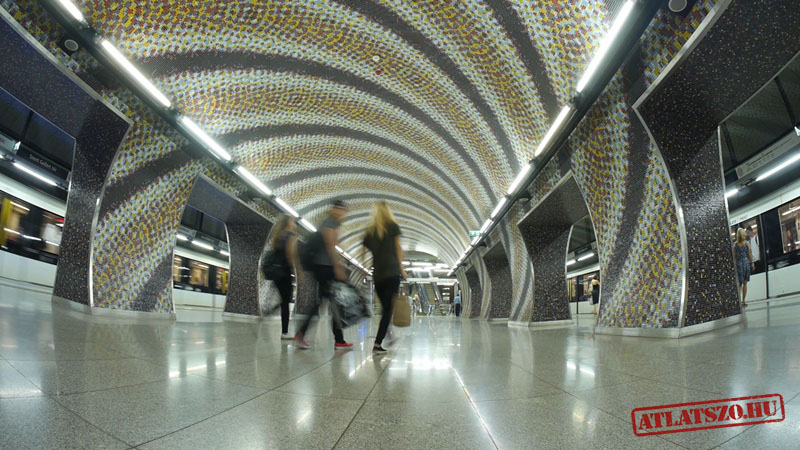The https://english.atlatszo.hu use cookies to track and profile customers such as action tags and pixel tracking on our website to assist our marketing. On our website we use technical, analytical, marketing and preference cookies. These are necessary for our site to work properly and to give us inforamation about how our site is used. See Cookies Policy
Budapest carries the weight of controversial subway venture
It has been two years since the M4, the fourth subway or metro line in Budapest was finally inaugurated. The project was completed after many years of delays, as usual, multiplying costs and there are still criminal investigations ongoing.
The fourth, M4 metro line in Budapest took 10 years to build for an exorbitant amount of money and was laced with criminal charges and accusations. It was handed over to the public two years ago and seeing the passenger number falling well short of the original plan, Hungary may have to pay back a large amount of funding that the European Union provided.

The M4 was a pet project of the earlier Budapest mayor Gabor Demszky of the liberal, now defunct SZDSZ who served five consecutive terms, leading the Hungarian capital for a span of 20 years. The original idea of the line dates back to the ’70s but the feasibility study was only completed in 1996. By that time, some experts were already skeptical of the 7.4-kilometer metro line, saying that it wouldn’t provide a good alternative for motorists, while most of its stations are situated in locations that already have good public transport access.
Nonetheless, Demszky made an agreement with the socialist MSZP government on the financing, only to see the project shut down after the conservative Fidesz won the election in 1998. It took another several years and the left wing to return to power until a budget was added to the M4 project in 2004. However, in order to secure the European Union funding, the overall project needed streamlining, several features were cut.
Eventually, the EU approved a big chunk of the financing, but less than anticipated, mainly because several parts of the project were commissioned without open tender. This was in 2009.
As the start of construction dragged on, the costs grew. The 1996 estimate put the costs at HUF 180 billion (€581 million), which went to HUF 480 billion (€1.5 billion) by 2007, a major increase even taking inflation into account.
After the Fidesz-backed mayor Istvan Tarlos took office in 2010, it was made clear that the second stage of the M4 would not be realized, and the first would only progress because at this point stopping it would have cost more, not to mention having to repay the funds the EU. Ultimately, the funding in 2012 was determined to come from a combination of EU funds, a state earmark and a loan taken out by Budapest rom the European Investment Bank.
Throughout the years the M4 project was lined with suspicions of corruption, Austrian builder Strabag was accused of giving donations to the governing MSZP-SZDSZ coalition for its continued involvement. Swietelsky came under similar suspicions to have its offices raided by authorities at one point. The project is closely linked to the downfall of the left-liberal political elite, which culminated in a number of corruption scandals at the Budapest municipality.
The trains servicing the metro line are also in the center of controversy. Allegedly, train maker Alstom paid former MSZP prime minister Peter Medgyessy’s family business a considerable sum. Investigation in the matter is still underway.
Overall the project cost HUF 500 billion (€1.6 billion). Unfortunately, the M4 isn’t seeing nearly the footfall it promised based on the old studies. Based on the results and the several controversial matters, Hungary may well end up having to repay parts or all of the EU-provided funding after the project’s review in 2017.
Your support matters
Atlatszo.hu is financed by nonpartisan and non-governmental sources;
we do not accept money from state institutions, political parties and affiliates.
We rely on support from readers. Donate here.
Share:
Your support matters. Your donation helps us to uncover the truth.
- PayPal
- Bank transfer
- Patreon
- Benevity
Support our work with a PayPal donation to the Átlátszónet Foundation! Thank you.
Support our work by bank transfer to the account of the Átlátszónet Foundation. Please add in the comments: “Donation”
Beneficiary: Átlátszónet Alapítvány, bank name and address: Raiffeisen Bank, H-1054 Budapest, Akadémia utca 6.
EUR: IBAN HU36 1201 1265 0142 5189 0040 0002
USD: IBAN HU36 1201 1265 0142 5189 0050 0009
HUF: IBAN HU78 1201 1265 0142 5189 0030 0005
SWIFT: UBRTHUHB
Be a follower on Patreon
Support us on Benevity!

